
Redefined Robert Graffeo, DDS
If you’re serious about replacing your missing teeth, and you want a solution you’ll be able to count on for literally decades to come, then you should definitely consider dental implants. Right now, they are the only treatment available today that restores an entire tooth from root to crown. They not only fill in any gaps within the smile, but they also bring back a person’s bite strength, plus they prevent the bone loss that normally develops after tooth loss. At the dental office of Robert Graffeo, DDS, we combine our dentists’ decades of experience with the finest materials to help patients rebuild their smiles for a lifetime to come. If you’re ready to have a complete set of teeth again, contact us today to get started with dental implants in Hoboken, NJ.


Dental implants are special because they work with your body in ways that bridges simply cannot do. In fact, they mimic the structure of natural teeth in practically every way! A dental implant itself is a small titanium post. Once placed where the missing tooth once was, it acts like the original root of your tooth did. It even goes so far as to fuse with your natural jawbone, making it incredibly strong and dependable. On top of that post, you get a crown, bridge, or dentures that looks and feels just like your natural pearly whites. Outside of professionals like us, no one will likely ever know you have a dental implant unless you tell them. Dental implants feel so lifelike that you may even forget you have them from time to time!

Dental implants are unique compared to dental bridges and dentures for one specific reason: they require oral surgery to receive. In order to replace teeth via dental implants, you’ll need to go through a several-month-long process where the titanium implants fuse with the jawbone. While this can seem difficult at first, the team at Dentistry Redefined will remain by your side every step of the way and answer any and all questions so you feel comfortable. To help you prepare, we encourage you to read more about the four most essential steps of your care: the initial consultation, surgery, osseointegration, and placement of restorations.

Our dentists will review your oral health and medical history as well as answer any questions you may have during your consultation. If you require preparatory services to make dental implant treatment safe and viable (i.e. gum disease therapy, tooth removal, bone grafting etc.), we’ll help you plan and complete these services first, then revisit your tooth replacement options. Before you leave, you’ll have a detailed understanding of your treatment plan and what to expect during each phase of your care.

Most dental offices require that their implant patients to visit multiple doctors in order to have the treatment completed, adding time, stress, and expense to the process. At our dental office, we turn this approach on its head by bringing the doctors to you. Dr. Graffeo works with a team of in-house specialists, including a prosthodontist and periodontist so patients can have their implants placed and restored right here in our Hoboken dental office. From your first consultation all the way until you leave with your new smile, you’ll be able to work with the same dentist and team that you trust.

Osseointegration is one of the most important stages of your dental implant treatment because it is essential to the longevity of your tooth replacement. After the implant post is placed and the gum tissue is stitched closed, it will fuse with your jawbone over a period of four to six months. When the implant has fused completely, the gum tissue can be reopened so an abutment can be attached.
Abutments are small metal connectors that not only allow the restoration to remain secure, but ensure it has proper stability through daily chewing and grinding. Over the next couple of weeks, your gums will heal around the abutment and you’ll come back to our office to have your crown, bridge, or denture placed.

Prior to attaching your restoration, we’ll perform a detailed exam to confirm everything is going well with your implant. We’ll capture digital X-rays to ensure it has fused properly and completely before attaching your crown, bridge, or denture, depending on how many implants you received. Additionally, we’ll make sure you’re happy with how it looks and feels. For example, your bite should remain even and your smile should look natural. Thanks to the natural-looking materials we utilize, only you and our office will know you had teeth replaced.

Why is it so many people turn to dental implants when they have missing teeth? It’s simple: out of all the available tooth replacement options, dental implants most closely resemble your natural teeth, and they come with several unique benefits. Here is a brief summary of some of the biggest advantages of choosing dental implants. Our team can go over these benefits in more detail with you if you schedule a consultation at our Hoboken office.

A full set of teeth makes it easier to live your day-to-day life to the fullest. When you replace your teeth with dental implants, you’ll have a chance to appreciate the following benefits regularly:

Since dental implants can mimic the roots of your natural teeth, they can benefit your oral health in a number of ways. Some of the health advantages they provide include:

Your dental implants will have plenty of benefits to offer in the short term, but they have plenty of long-term advantages to consider as well, such as:

Patients with any number of missing teeth can benefit from dental implants, they just need relatively good oral health and a jawbone strong enough to support the new roots. Once Dr. Graffeo has confirmed this with an exam, he can design an implant treatment to reverse any degree of tooth loss:

Instead of filing down the teeth near the missing one to support a bridge as we would have in the past, Dr. Graffeo can simply attach a dental crown to a single implant root without disturbing someone’s remaining teeth.

Traditional prosthetics like bridges and partial dentures can be secured within the mouth using a minimal number of implants. Compared to their removable counterparts, these teeth are much more stable and can be trusted to last longer as well.

For extensive tooth loss, all it takes is just four to six implants placed strategically along the jawbone to provide the base for a full denture. Implant dentures not only fit more comfortably than regular ones, but they also allow for a much stronger bite.

In order to be as effective as possible, every dental implant treatment has to be personalized based on a patient’s unique situation. Because of this, the cost of the procedure is always different from person to person. While implants tend to be more expensive than other options, they are intended to last for decades, and they often help patients save tremendously in the long run. Over the life expectancy of a single implant, a patient would have to replace their regular bridge or denture multiple times, easily spending more than the cost of the implant.

Treatments for preexisting issues like gum disease and necessary tooth extractions will increase your overall cost. It’s important that you have a healthy mouth before we begin surgery to ensure the success of your implants. Your dental surgery will incur its own specific price, which can go up depending on anesthesia during the procedure. Because we place and restore dental implants at the same location, you’ll enjoy more convenient and compact fees instead of separate payments to a specialist.

The number of dental implants necessary for your smile will directly impact your cost. Additionally, dental implants are made of different materials like titanium and zirconia with varying brands/manufacturers. Just like cars or clothing, some brands last longer and work better than others, which is a factor to keep in mind when choosing your dental implants. We will always be transparent about the types of dental implants we use, and the cost associated with them.
We offer different types of dental implants in Hoboken based on varying patterns of tooth loss. Usually, the more teeth that you’re missing, the more expensive your treatment will be. For a single missing tooth, we can use an implant-retained crown to seamlessly complete your grin. If you have multiple missing teeth consecutively, we may recommend an implant-retained bridge to fill the space in with a strong and beautiful replacement. To replace an entire smile, an implant denture can be used for the most stable restoration.

There’s no getting around the fact that dental implants cost more than traditional dental bridges and dentures. However, did you know that dental implants are typically the more cost-effective solution in the long run? Traditional tooth replacement options wear down and need to be replaced every several years, and they can sometimes exacerbating oral health issues like gum disease and enamel erosion. With the one-time cost of dental implants, you can enjoy a strong, reliable tooth replacement that can last a lifetime, saving you thousands of dollars in replacements alone! Plus, dental implants support better oral health and promote systemic wellness, which can lower the cost of your annual oral and overall healthcare.

Typically, dental insurance does not cover dental implants because it is seen as an elective treatment. However, at Dentistry Redefined, we are committed to providing our patients with the most affordable oral healthcare possible. That’s why we’ll do our best to maximize your dental insurance benefits in any way that we can. Typically, your initial consultation, treatment of preexisting gum disease or decay, and part of your restoration can be covered by insurance, but it will all depend on your plan. If you have any questions, please don’t hesitate to contact our office!

If you don’t have dental insurance, there’s no need to worry! As a part of our commitment to affordable dental care for all budgets, we accept alternative financing through CareCredit. Patients can enjoy low-to-no interest, cost-effective monthly payments to get the healthy smiles they deserve.
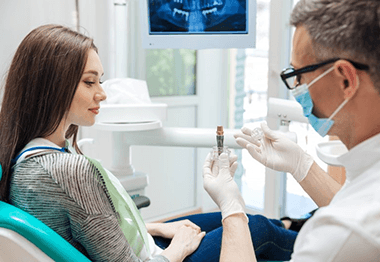
Although dental implants offer one of the most comprehensive and long-lasting solutions for replacing missing teeth, we’ll need to ensure that your mouth is ready to support them for as long as possible. Since your jawbone can start to deteriorate due to tooth loss, this can cause complications later on or even risk implant failure if not addressed beforehand. Some of the most common advanced procedures for ensuring successful results include bone grafting, sinus lift, ridge expansion, and PRP/PRF treatment. Here’s what you should know about each service and how they can help promote a stable foundation for your new smile.
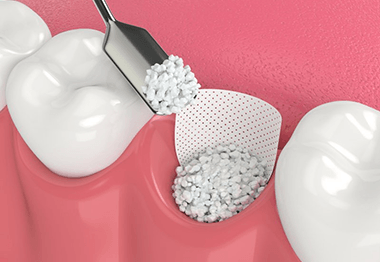
Did you know that your tooth roots are essential for stimulating your jawbone to promote stronger tissue? Without them, your jaw can begin to deteriorate, weakening the hold they’ll have on any of your remaining teeth. Although dental implants can serve as new permanent roots, you’ll first need to have sufficient bone density to support them. If you don’t have enough tissue in the area, then we’ll likely perform bone grafting to promote stronger jawbones.
This involves taking bone from your body or a donor and embedding it into a specific area after making a small incision in the gums. We’ll suture your gums closed and wait for the grafting material to fuse with your jawbone to encourage stronger tissue. This can take several months to finish, but it can be crucial to making your dental implants last a lifetime!
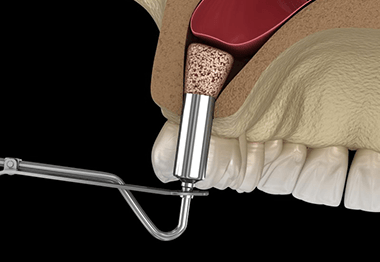
The upper jawbone can also start to deteriorate if you’re missing teeth there. If the bone tissue is less dense around your back molars, placing a dental implant in the area can end up poking your sinus cavity during your placement procedure. To help promote a thicker upper jaw, we may have to perform a sinus lift that involves carefully pushing the membrane up to make space for grafting material. This should encourage stronger bone growth and allow your jawbone to become dense enough to support dental implants without impacting your sinus cavity.
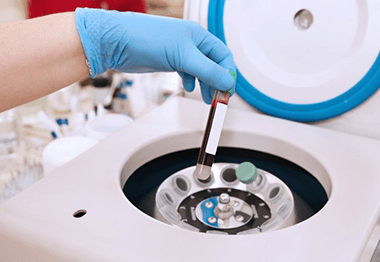
Our team will want to ensure that your recovery from dental implant surgery is as smooth and pain-free as possible. For this reason, we can provide PRP/PRF treatment to help make your healing process much more efficient. This involves extracting some of your blood at the start of your procedure and placing it in a centrifuge for preparation. After we’ve completed your surgery, we’ll apply the blood to your surgical site(s) to promote quicker recovery. This holistic method can also help reduce discomfort during healing and significantly lower your risk of infection.
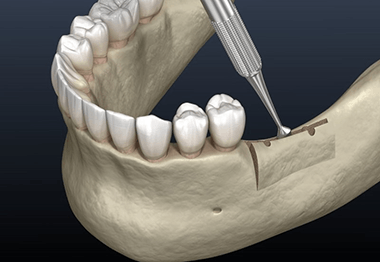
This is another form of bone grafting that is typically reserved for patients whose jawbones aren’t wide enough to support dental implants. For this procedure, we’ll make a horizontal incision in the gums and jawbone, dividing the bone tissue into inner and outer portions. We’ll then carefully push these sections apart to create space to embed grafting material (from either a donor or another part of your body) in between the two parts. This should help promote stronger and denser bone tissue to reliably hold your dental implants in place.

Can dental implants fail? Part of what makes dental implants so great is their incredibly high success rate. However, even with dental implants being successful 95% of the time, it is still possible for them to fail. This can happen if the patient doesn’t have enough jawbone to properly support dental implants. However, one of the main causes is smoking. Using cigarettes after getting dental implants can cause them to fail because tobacco not only hurts your gums, but it slows down the healing process as well. Additionally, inadequate oral healthcare (routine brushing and flossing) can lead to gum disease, which may cause implant failure.
Should you ever begin to notice gum swelling, redness, sensitivity, or looseness around your dental implant, do not hesitate to give us a call! We may be able to resecure your smile with a dental salvage procedure.
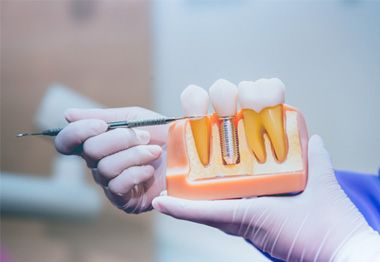
Unlike restoring a tooth with a crown, rebuilding one from the roots up with dental implants requires a much lengthier process. Our team has an in-house implant specialist, so you’ll be sure to undergo the entire treatment in the same office you already know and trust. While the results are incredible and long-lasting, you’ll have to undergo a recovery process that is crucial for the success of your restorations. Fortunately, you should feel back to normal after several days. Here are several dental implant post-op instructions you’ll need to follow after undergoing your surgery in Hoboken.

Due to the local anesthetics and sedatives we administer before your procedure, you’ll likely feel out of it even after we’ve completed your procedure. That’s why you’ll need to arrange for a friend or loved one to take you to and from your visit. We typically recommend taking your first dose of prescribed pain relievers before the numbing effects wear off. Even while your mouth is still numb, don’t chew on or drink anything (other than pure water). Be sure to rest plenty, as this can help promote a speedy recovery.

It’s normal to experience some mild discomfort, swelling, and occasional bleeding after undergoing dental implant placement surgery. Fortunately, these symptoms can be managed fairly easily by using gauze pads, a cold compress, and taking over-the-counter/prescription pain medications. However, if these side effects don’t dissipate after around a week, or you’re experiencing symptoms that are getting worse, be sure to notify us right away for help.

To avoid disturbing the surgical site while it heals, you’ll need to implement a diet consisting of softer foods. Your meals should include nutritious and easy-to-chew options, such as:

Since the surgical site will need to heal over several months, the last thing you’d want is to allow bacteria to accumulate and infect your gums or damage the connective tissues. This can delay your recovery, disrupt osseointegration, and lead to dental implant failure. For this reason, you’ll want to brush at least twice a day, being extra careful around your implants. Floss once a day or after every meal and rinse with mouthwash frequently. Don’t spit out forcefully, as this can disturb the surgical site.

It should take about a couple of weeks to fully recover from dental implant placement. However, your jawbone will still need to bond with your metal posts over several months. After osseointegration is successful, you’ll return to our office to receive your dental crown, bridge, or denture. While this attachment process is usually fast and comfortable, you might expect to feel slight gum sensitivity for about a day while your mouth grows accustomed to your brand-new teeth. Afterward, you should be free to enjoy a full smile that looks and feels completely normal again!

Once your final restoration is in place, the dental implant process will be complete. At that point, your main focus should be on protecting your new smile. Our team can walk you through the basic steps of caring for dental implants, and you can always give us a call if you have any concerns. Here are just a few simple maintenance tips that you should always keep in mind.

You should already be brushing, flossing, and rinsing every day as part of your oral hygiene routine. Once your dental implants are in place, you should give them the same care as the rest of your smile. This might seem odd since dental implants aren’t susceptible to tooth decay, but remember: the implant posts are still surrounded by gum and bone tissue. If an infection occurs in this area, it could lead to problems with your implants. With good oral hygiene, it will be much easier to avoid infections and keep your restored grin in excellent shape.

Leafy greens, yogurt, cheese, various fruits and vegetables, and whole grains are all examples of foods that can help you maintain better oral health, which makes them excellent options for your diet after completing the dental implant process. Try not to eat too many sugary or starchy snacks, as they could lead to gum disease and put your dental implants at risk. (You don’t necessarily need to avoid them altogether though; an occasional treat should be fine.)

Sometimes the little habits that you engage in every day can eventually put your dental implants at risk. Once your new teeth are in place, take care to avoid:
It’s important to take note of any negative oral habits you might have so that you can start coming up with strategies to break them.

As strong as dental implants are, it’s not impossible for them to break. So if you’re participating in any kind of athletic activity where you might get hit in the mouth (such as football or another kind of contact sport), always remember to wear a mouthguard. Bruxism (nighttime teeth grinding) can also damage your implants, so it may be a good idea to ask our team for a nightguard.

Of course, when it comes to taking care of your smile, you can’t forget about your biannual dental appointments. These visits let your dentist check on your dental implants to make sure that they’re receiving proper care. We’ll let you know if there are any problems that might require treatment.

Are you still curious about dental implants? If so, you’ll always get precise answers to your questions by contacting our office to speak with one of our friendly staff members. However, we’ve also made it easy for patients to get the information they need by including a list of dental implants FAQ’s along with their answers. Read on to satisfy your curiosity!
One of the main benefits of dental implants in Hoboken is that they look, feel, and function just like your natural teeth. This means getting used to your new smile will be easy! You can speak with confidence, smile with beauty, and chew your favorite foods with ultimate strength. As an added advantage, dental implants are easy to maintain—just brush and floss them as you would your natural teeth. In some cases, we may recommend an interdental brush or water flosser for more thorough cleaning.
While dental implants require surgery, patients who have experienced the treatment relate the sensation to a simple tooth extraction. We will ensure that you’re numb and comfortable before beginning, and we also offer sedation dentistry for a greater sense of relaxation. In fact, the only discomfort you will feel is some slight soreness after your appointment. However, this will get better after a few days. If the discomfort doesn’t go away, please contact our expert dentist in Hoboken.
Dental implants come with a step-by-step process that is more complex compared to other restorations due to the surgery. In many cases, implants can be placed in a single visit, but then you will begin a healing period of at least 3 to 4 months called osseointegration. Once the implants have fused to your jawbone completely, you’ll come back into our office for your restorations. During osseointegration, we will give you temporary restorations to maintain your appearance and chewing ability.